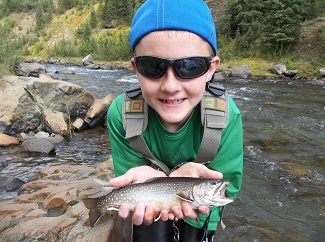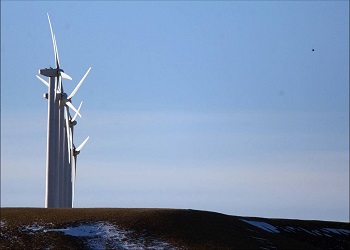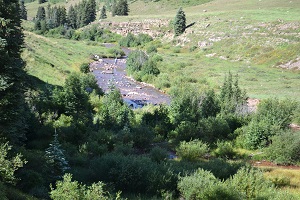A bipartisan, legislative effort is underway in DC to protect the Hermosa Creek watershed just north of Durango, Colorado. Senator Michael Bennet and Representative Scott Tipton have joined forces to sponsor companion bills in both houses of Congress. When successful, this federal bill will protect an entire, intact watershed as a whole unit – a first in the US!
The Hermosa Creek Watershed Protection Act of 2013 represents ten years of exhaustive work by both TU volunteers and staff. In true “One TU” spirit, the Hermosa Creek area has long-been a focus area for TU. In fact, it is the Hermosa Roadless Area which prompted the formation of TU’s national public land division, the Sportsmen’s Conservation Project (SCP, formerly the Public Land Initiative) in 2004. At that time, the ‘Roadless Rule’ was more than controversial. Hermosa Creek contains Colorado’s largest, unprotected roadless area. For this reason, SCP was born, then employing just two staff. Today, SCP continues to be headquartered in Durango and has grown to 29 staff in twelve western states.
 While Hermosa Creek is a favorite among all types of backcountry recreationists (mountain bikers, OHV enthusiasts, backpackers, campers etc.), the basin is particularly important to sportsmen. The upper third of the basin is home to CPW’s largest and most important native Colorado River cutthroat trout reintroduction areas. The remaining two-thirds of the basin is loaded with hungry rainbows, cutthroats and brookies, eager to take a summertime dry fly. In 2010, Hermosa Creek was featured in an episode of TU’s ‘On the Rise’, highlighting the cutthroat fishery. Furthermore, the western half of the basin contains some of SW Colorado’s most productive and spectacular elk habitat. In 2009, Hermosa Creek received a state designation of ‘Outstanding Waters’ for its exceptionally high natural water quality. Hermosa Creek is vital to diluting acid mine drainage from mines above Silverton into the headwaters of the Animas River. This recognition of water quality was a first for an area not designated as a wilderness area.
While Hermosa Creek is a favorite among all types of backcountry recreationists (mountain bikers, OHV enthusiasts, backpackers, campers etc.), the basin is particularly important to sportsmen. The upper third of the basin is home to CPW’s largest and most important native Colorado River cutthroat trout reintroduction areas. The remaining two-thirds of the basin is loaded with hungry rainbows, cutthroats and brookies, eager to take a summertime dry fly. In 2010, Hermosa Creek was featured in an episode of TU’s ‘On the Rise’, highlighting the cutthroat fishery. Furthermore, the western half of the basin contains some of SW Colorado’s most productive and spectacular elk habitat. In 2009, Hermosa Creek received a state designation of ‘Outstanding Waters’ for its exceptionally high natural water quality. Hermosa Creek is vital to diluting acid mine drainage from mines above Silverton into the headwaters of the Animas River. This recognition of water quality was a first for an area not designated as a wilderness area.
The proposal to protect Hermosa Creek was the result of an open, all-inclusive, stakeholder-driven process initiated by Five Rivers TU chapter president, Chuck Wanner, in 2008. The ‘Rivers Protection Workgroup’ met for 22 months and enjoyed participation by everyday citizens, conservationists, water development advocates, federal and state agencies, county governments, a tribe and representatives from every Hermosa recreational user group. In the end, the workgroup reached overwhelming consensus that the Hermosa Creek area is worthy of federal protection. Senator Bennet’s staff took the recommendations of the workgroup and created legislation, which was adopted by Representative Tipton in April of 2013. The Hermosa Creek Watershed Protection Act has received unanimous support locally, across the region and the state.
Sportsmen have unified and spoken as one in support of protections for Hermosa’s exceptional backcountry. The ‘Sportsmen for Hermosa’ is a coalition of sportsmen’s conservation groups, fly shops, guide/outfitter services, hunting retailers, rod manufacturers and more. Learn more about the TU-led coalition and proposal at: www.facebook.com/sportsmenforhermosa or www.hermosacreek.org.
In a time when Americans can’t seem to agree on anything, it is refreshing to see a community, its elected officials and every user group can come together around a very special place, ensuring out sporting heritage is passed down to the next generation of anglers and hunters.
- Ty Churchwell, Backcountry Coordinator
Sportsmen’s Conservation Project, Trout Unlimited










